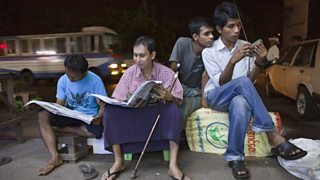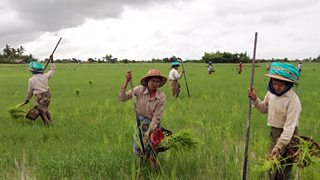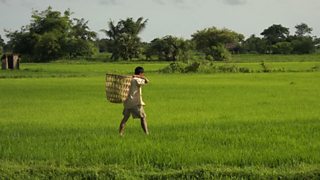The challenges of conducting research in Burma
Chris Larkin
Research Manager, Βι¶ΉΤΌΕΔ Media Action in Burma
Tagged with:
"Where in the past we were bound tightly by ten ropes, nowadays I feel like the number of ropes has been reduced by two.” These were the words of an elderly man who earlier this year took part in a Βι¶ΉΤΌΕΔ Media Action focus group in Burma (also known as Myanmar).
He was speaking from Yangon where there have been palpable changes in freedom of expression and access to information in recent times. Public demonstrations are now permitted more often, low-cost SIM cards are improving people’s access to information on mobiles and 11 new daily newspapers have launched - some carrying strong opposition views.

But for the majority of Burma’s population – who live in rural areas, did not finish secondary education and have more limited access to media – day-to-day life has not changed in any radical way.
Research challenge
As a researcher working to inform media projects to support improved governance in Burma, understanding the extent to which the public feels they are informed and able to speak, question and take action is crucial.
But the irony in conducting research of this kind is that the restrictions people perceive to remain around freedom of expression and association influence how they react when posed with questions on these themes.
Our research and learning team realised the extent of this challenge in Burma, while conducting our research earlier this year.
From May to July, we took a multi-methods approach to a study that sought to understand the issues of concern to the public; their expectations of leaders; perceptions of accountability and opportunities and barriers to engage in dialogue and take action on issues of local importance.
The study employed both quantitative and qualitative methods, conducting a nationally representative household survey of 1224 people, as well as focus group discussions and key informant interviews in communities across five of Burma’s 14 states and regions. The Yangon resident quoted above was one of more than 220 people who actively participated in such discussions.
Conflicting findings
While participants in focus groups engaged in lively discussions about the shortcomings of health, education and water and sanitation services in their communities, 32% of the survey participants said that they ‘did not know’ about any matter of concern to people in their local area.
Focus groups revealed that in some rural areas people were confused about whether the government or an INGO should be responsible for public service provision, and that most villages had no interaction with their local authorities beyond requests sent down through village administrators to “raise funds”. In contrast, 70% of rural survey participants told us that their local government did indeed respond to the needs of citizens.

So what do these conflicting sources of data tell us about the realities of a Burma in transition - and how best to research the public’s experience?
The cautious answer: ‘I don’t know’
The first takeaway is a sense check on where and when large-scale survey research can have value in Burma right now.
Do 32% of people in Burma really not have an opinion on what’s causing concern for people in their own communities? We are not convinced and feedback from the field provides several reasons why responses like this are more likely to be avoidance than lack of awareness.
Field interviewers describe participants’ cautious reactions to the survey experience, and to particular questions. Some participants showed caution in expressing an opinion on social or political themes, some caution in expressing an opinion to a stranger, and others caution in expressing an opinion at all.
In a country where people have been actively discouraged from expressing opinions for decades, ‘I don’t know’ is a very easy way to avoid making statements that might draw unwanted attention - despite assurances that the process is confidential and anonymous.
Willingness to respond
Tracking shifts in people’s willingness and ability to respond to questions like these in the future will reveal a lot about the public sense of confidence and capacity to play a role in the political landscape.
Freedom metrics included in the survey provide an internal benchmark too. Ask the public how free they think they are to say what they think and 68% will tell you that they are ‘somewhat’ or ‘very free’.
But qualify that statement to freedom to express ‘views about the government in public’, and the figure drops to 43%, with 25% saying they do not know. The caution exercised for some but not other survey questions suddenly makes more sense.
As a means to understand media consumption and the most effective ways to reach marginalised groups however, the survey is a useful tool. Ask people how often they watch television and response rates jump back to 99%.
Multi-method is the way to go
The data demonstrates also the value of a multi-method approach. Where the quantitative survey required data collectors to ask questions in households where they were strangers, our qualitative study took a more participatory approach.
Through a continuing partnership with ActionAid Myanmar, we trained young community mobilisers to facilitate in-depth discussions in villages where they are known and trusted by the inhabitants.
Facilitators were able to create a safe space where respondents were at their ease, probe gradually to draw out explanations beyond surface respondents, and break down unfamiliar concepts - such as who is ‘accountable’ for community development - into hyper-local terms.

The resulting data provides rich insights into people’s engagement with and expectations of governance processes, and aids interpretation of the big numbers coming from the survey.
For example, where a survey statistic alone would suggest that people are quite satisfied with their local government’s level of responsiveness (69%), the focus groups revealed that people had very low expectations of local government to provide anything in the first place. When expectations are low, criticism will be too.
We do need to recognise that young mobilisers may already have influenced political awareness and attitudes in communities like these, and so may set those people apart from the wider population in some way. However the insights that can be gained from people confident enough to exercise voice in a research setting are invaluable in a country where so little data on the individual experience of governance exists.
Value of participatory approaches
Our elderly Yangon resident went on to say: "We have started to have the right to speak freely. In the past, we didn't tell each other as we didn't trust each other. We just suffered alone. But now we have started to discuss bravely whether what we feel or think is right or wrong."
If his view rings true for how people in Burma will adapt to their changing political context, it may be that large-scale surveys will become powerful tools to inform governance work in the future.
In the meantime, however, researchers should be looking to partner with communities themselves to draw on the strengths that qualitative, in-depth, personal approaches can offer.
Related links
Follow Βι¶ΉΤΌΕΔ Media Action on and
